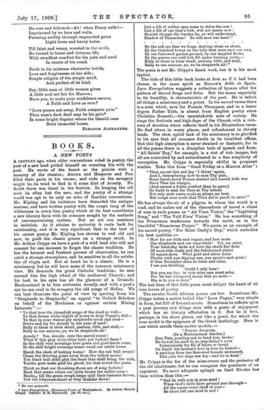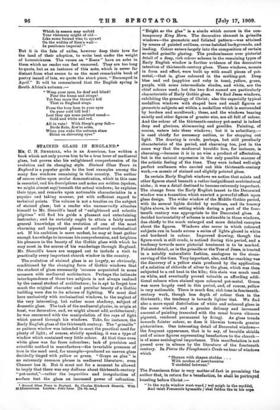BOOKS.
A NEW POET.f A CENTURY ago, when older conventions ruled in poetry, the poet of a new land prided himself on counting kin with the past. He wrote of the desert or the prairie with a memory of the classics ; Aurora and Hesperus and Pan filled their parts in his verses ; and rude as the savagery might be, he tried to find in it some hint of Arcady. No doubt there was tinsel in the fashion. In keeping the old note he often lost the new, and the poetry of a strange world was apt to be only an echo of familiar conventions.
Mr. Kipling and his imitators have discarded the antique manner, and have written poetry with the rough tang of the wilderness in every line, poetry which at its best constitutes a new literary form with its romance sought by the methods of uncompromising realism. But no art can continue in isolation. As it attains to maturity it casts back for relationship, and it is very significant that in the best of his recent poetry Mr. Kipling has striven to wed old and new, to graft the classic graces on a strange stock. In Mr. Arthur Cripps we have a poet of a wild land who will not consent for one moment to forget the classic tradition. He has the keenest and freshest powers of observation, he can catch a strange atmosphere, and be sensitive to all the subtle- ties of -virgin soiL But at heart he is a classic. He is a missionary, but he will have none of the common missionary view. He demands the great Catholic tradition; he sees around him the high ritual of the mediaeval Church ; and his task in his eyes has all the glamour of a Crusade. Mashonaland is to him authentic Arcady, and with a poet's eye he can read in its savagery the old songs of Hellas. We can best illustrate the point of view by quoting from his "Shepherds to Shepherds," an appeal "to Oxford Scholars
on behalf of the Mashonas as against certain Mining Interests" :—
"Ye that love the sheepfold songs of the dead so well— Ye that dream white nights of yours in deep Tempo's dell— Ye that in your visions ply shepherd's crook and reed— Strive and cry for Arcady in her year of need ! Rally to them in their strait, pasture, tilth, and stall,— Rally to our succour, ye, we be shepherds all!
Arcady ? Yes, Arcady, ours the sacred name !
What if this grey river-chine hath not Ladon's fame ?
In the chill vext mornings here goats and goat-herds come, In the still bright evenings hence wend our cattle home.
Harsh the clash of locking horns ! How the red bull sways ! Chase the thieving goats away from the tufted maize! Yon black bull shall glut the feast that shall bring the rain, Yonder goat make glad his ghost, his that sowed the grain.
Think ye that our threshing-floors are of song forlorn ? Hark that music where our clubs bruise the millet corn— Beating till the green rough heaps spill their treasure brown, List the Lityerses-chant as they thunder down!
• He was poisoned.
• Lyra Erangelistica: Missionary Verses of Mashozsaiand. By Arthur Shearly Cripps. Oxford: B. H. Blackwell. [2s. 61 net.]
List a lilt of robber men come to drive the cow ! List a lilt of one that's loth, will not marry now ! Boorish though the burden be, ye will understand, Shadow of Theocrittus ! Ye will save our land!"
By the red ore that we forge, dashing stone on stone, By the thatched towns on the hills that were once our own, By our furrowed garden-ground, by our dappled flocks, By the graves our cold folk fill under burning rocks,— Rally to them in their strait, pasture, tilth, and stall, Rally to our succour, ye, we be shepherds all The poem is not Mr. Cripps's finest work, but it is his most typical.
The title of this little book looks at first as if it had been chosen in the same spirit as Borrow's Bible in Spain. Lyra Evangelistica suggests a collection of hymns after the pattern of Sacred Songs and Solos. But the name, especially in its humility, is characteristic of the poet. He is before all things a missionary and a priest. In his sacred verses there is a note which, save for Francis Thompson, and in a lesser degree Father Tabb, is absent from English poetry since Christina Rossetti,—the unmistakable note of ecstasy. He sings the festivals and high-days of the Church with a rich- ness of devotion which reflects itself in his Elizabethan verse. He find altars in waste places, and refreshment in thirsty lands. The slow, uphill task of the missionary is so glorified in his eyes that all romance dwells in its humblest offices. But this high absorption is never strained or fantastic, for in all the poems there is a disoipline both of speech and form. "All Saints' Day," for example, is a riot of rich images, but all are controlled by and subordinated to a fine simplicity of conception. Mr. Cripps is especially skilful in pregnant similes. Take this from "Good Friday at a Mission Altar": "Thou sayest this sad day 'I thirst' again, And I, remembering how to ease Thy pain, Some harsh-faced Roman stained and seared with war Gave Thee his vinegar,
(And earned a fuller comfort than he gave,)
Go forth to seek for Thee at Thy behest Not only such suave souls as please me best, But rough sour souls that Thou did'st parch to save !"
He has always the air of a pilgrim to whom the world is a road, and he makes out of the discomforts of travel a ritual of ease in such poems as "Ad Viam Viator," the "Lightning Song," and "The Veld Fires' Vision." He has something of the Franciscan tenderness towards the earth, as in the beautiful "Franciscan Prayer." We quote, as an example of his sacred poetry, "For Saint Cecily's Day," which embodies his best qualities :—
" How far are viols and organs, and how mute
Our shepherds and our song-birds! Yet, my saint, Your feast-day lacks not here the shrill fine flute Of noon-tide cicale and the fall-horned plaint Of sunset-dove. What gold and silver noise Thrills with yon dipping sun, yon moon's arch poise ! 0 blue November skies so tense and clear, I see you thrilling. Could I only hear !
But you are far : in vain mine ears must ache,
For 'tis but whispered music that ye make—
She is to you so near."
The last lines of this little poem must delight the heart of all true lovers of poetry.
The secular South African poems are few. Sometimes Mr.
Cripps writes a native ballad like "Love Pagan," very simple in form, but full of fire and music. Sometimes he reflects upon a past journey and things seen with a gusto of enjoyment which has no literary affectation in it. But he is best,
perhaps, in his short pieces, cut like a jewel, for which the true model is the epigrams of the Greek Anthology. Here is one which recalls these earlier models :—
"FOUND STARVED.
(In a Mashonaland Garden.)
Dire Fate, availing not to bend him, broke! He bowed his neck to no step-father's yoke Submissively for fill of blows or bread.
On Earth his mother's love in love he leaned— A suckling from her furrowed breasts unweaned,
This year her dugs ran dry—and he is dead."
Mr. Cripps is the foe of the mine-owner and the protector of the old inhabitants, but he can recognise the greatness of an opponent. No more adequate epitaph on Cecil Rhodes has been written than this :— "God be with you in your need !
When God's mills have ground you through— All the coarse cruel chaff of you—
Be there left one seed to sow !
Which in season may unfold Your visionary might of old— Like some fecund vino to sprawl On the widths of Sion'a wail— In penitence imperial!"
But it is the fate of exiles, however deep their love for the land of their adoption, to write beat under the weight of homesickness. The verses on "Essex" have an ache in them which no reader can feel unmoved. They are too long to quote, but as an instance of this note, which is never far distant from what seems to us the most remarkable book of poetry issued of late, we quote the short piece, "Encamped in April." It will be remembered that the English spring is South Africa's autumn:—
"Wrap your eyes, lie deaf and blind! Fear the hums and stings! Yet fear more the thrush's bill That in England sings.
Press the torn hem to your eyes On your cold hill bed !
Lest they spy some painted mead—
Gold and white and rod.
All in vain! With Sleep's grey fall—
Birds flute, flow'rs arise, When you wake the autumn stars Shine on shivering eyes."









































 Previous page
Previous page